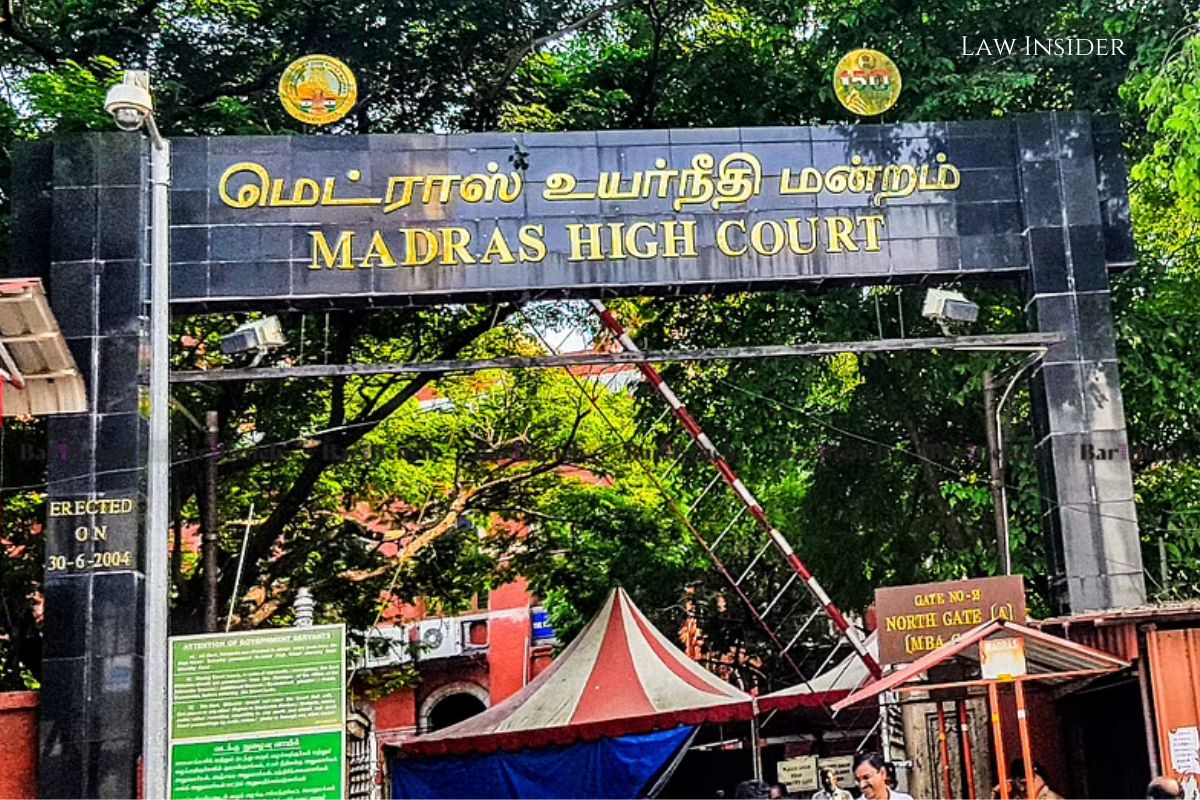Sakina Tashrifwala
Published on: October 8, 2022 at 17:59 IST
The Madras High Court has found that an arbitral award mandating particular execution of a contract cannot be overturned on the grounds that the nature of the parties’ agreement was not susceptible of specific enforcement.
The Court further stated that the aforementioned problem concerned the structure of an agreement, which cannot be used to interfere with an arbitral result under Section 34 of the Arbitration and Conciliation Act of 1996. (A&C Act).
The Division Bench of Justices Paresh Upadhyay and D. Bharatha Chakravarthy concluded that an arbitral decision cannot be overturned because it required particular execution of an inequitable contract that conferred an undue benefit to one party.
The appellant, a property developer, and the respondents entered into a selling agreement in which the respondents agreed to sell the property owned by them.
The appellant mortgaged the said property’s title documents and received a loan in order to finish its project involving the creation of residential homes on the said land.
Following that, the respondents sold some plots in the aforementioned property to the appellant via a sale deed.
Following that, the respondents refused to execute any additional sale documents related to the other plots in the aforementioned property.
The defendants sent the appellant with a legal notice prohibiting it from dealing with the unsold plots in any way.
The appellant used the selling agreement’s arbitration clause.
The appellant/claimant requested particular execution of the sale agreement, instructing the respondents to execute and register the sale deeds related to the unsold plots in its favour, as well as a claim for damages, in the statement of claims presented to the Arbitral Tribunal.
In their counterclaim, the respondents claimed that there was a significant increase in the price of the relevant property that was not anticipated by the parties when they entered into the sale agreement, and so it would be inequitable to enforce the particular performance of the sale agreement.
The Arbitral Tribunal granted the appellant’s claim and issued an award instructing the respondents to execute the sale deeds in the appellant’s favour.
The respondents petitioned the Madras High Court under Section 34 of the A&C Act to vacate the arbitral decision.
The respondents, including J. Vengatesh, argued before the Single Judge that the sale agreement was inequitable and unfair, and that the arbitral award directing specific performance of the agreement violated the principles governing contract specific performance under the Specific Relief Act of 1963.
As a result, the respondents contended that the arbitral ruling was clearly unconstitutional and violated India’s basic policy.
According to the Single Judge, the asserted agreement was not in the nature of a sale agreement and hence was not specifically enforceable.
Furthermore, the Court determined that the aforementioned arrangement offered the appellant/developer an unfair advantage.
The Court noted that the appellant made no investment under the aforementioned arrangement and that the appellant got an unfair benefit under the agreement by paying just a minor amount of money.
As a result, the Court concluded that the agreement was not explicitly enforceable and that the arbitral ruling violated Indian public policy.
As a result, the Single Judge gave a monetary reward to the appellant in lieu of particular execution of the agreement.
In response, the appellant filed an appeal before the Madras High Court Division Bench under Section 37 of the A&C Act.
M/s. Macro Marvel Projects, the appellant, argued before the High Court that the parties’ transaction was neither inequitable or unjust to the respondents.
The appellant further claimed that the Single Judge overturned the arbitral decision on the basis of findings that went beyond the reasons provided by Section 34 of the A&C Act.
The respondents contended that the selling agreement generated an inequitable and unjust benefit for the appellant/claimant and hence was not explicitly enforceable.
The Court underlined that in an application under Section 34 of the A&C Act, no interference, variance, or modification of the arbitral decision can be granted.
The court concluded that the Single Judge had exceeded his authority under Section 34 by altering the arbitral ruling and imposing a monetary award in favour of the appellant in lieu of specified performance.
Noting that the respondents/award debtors filed the petition under Section 34 to set aside the arbitral award prior to the alteration of Section 34, the Court resorted to the provisions of Section 34 as they stood prior to their amendment by the Arbitration and Conciliation (Amendment) Act, 2015.
The Court noted that the Single Judge had thrown aside the arbitral decision on the grounds that the Arbitral Tribunal had failed to evaluate whether the arrangement between the parties was a sale agreement or an agency/brokerage agreement.
The bench decided that the aforementioned problem concerned the formulation of an agreement, which could not be used to interfere with the award under Section 34.
The Court went on to say that an arbitral decision cannot be overturned because it required particular performance of an inequitable contract that conferred an undue benefit to one party.
While determining that intervening on the aforementioned ground would have the effect of sitting in appeal over the arbitral judgement, the Court ruled that it cannot interfere with or set aside an arbitral judgement just because an alternative opinion is conceivable.
“Thus, it can be seen that there are rival contentions between the parties which require appreciation of the evidence and taking into account the conduct of the parties during the transaction.”
“When the Arbitral Tribunal had appraised the evidence and rendered its findings upon consideration of the facts that it is a case of specific performance, interference, once again on the ground of inequitable nature or unfair advantage would only be to sit on appeal over the arbitral award and therefore, was not possibly a ground available for the learned Judge to interfere with the award.”
As a result, the Court granted the appeal and reversed the Single Judge’s decision.

